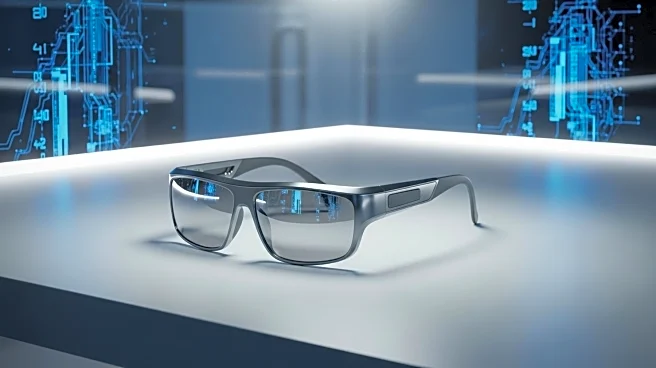What's Happening?
Meta's Ray-Ban Display glasses have been dissected by iFixit, revealing that the standout feature is the glass technology rather than the internal tech components. The glasses utilize a reflective geometric waveguide system within the lenses, which directs light to the wearer's eyes at specific angles using partially reflective mirrors. This design prevents others from seeing the screen content when looking at the wearer. The glasses also incorporate a micro-projector in the right arm, using a liquid crystal on silicon (LCoS) device to project a 600x600-pixel grid image. Unlike older AR glasses that use diffractive systems, the Ray-Ban Display's lenses avoid rainbow artifacts and 'eye glow' effects. However, the advanced glass technology is costly to produce, leading to speculation that Meta might be selling these glasses at a loss. iFixit's teardown revealed that the glasses are difficult to repair, requiring specialized skills and tools, as Meta did not design them for easy disassembly and reassembly.
Why It's Important?
The innovative glass technology in Meta's Ray-Ban Display glasses represents a significant advancement in augmented reality (AR) eyewear, potentially setting a new standard for visual clarity and privacy. This development could influence the AR industry by encouraging other manufacturers to adopt similar technologies, enhancing user experience and privacy. However, the high production costs may impact the marketability and accessibility of such advanced AR devices, potentially limiting widespread adoption. The unrepairable nature of the glasses also raises concerns about sustainability and consumer rights, as users may face challenges in maintaining their devices without professional assistance.
What's Next?
As Meta continues to develop its AR technology, the company may need to address the repairability and cost issues to make the Ray-Ban Display glasses more consumer-friendly. This could involve exploring more cost-effective manufacturing processes or offering repair services to ensure longevity and customer satisfaction. Additionally, the AR industry may see increased competition as other companies strive to match or exceed the technological advancements demonstrated by Meta. Stakeholders, including tech companies and consumers, will likely monitor these developments closely, assessing the impact on the future of AR technology and its integration into everyday life.
Beyond the Headlines
The introduction of advanced glass technology in AR glasses could have broader implications for privacy and security in wearable tech. As devices become more discreet and capable of displaying information without external visibility, ethical considerations regarding data protection and user consent may arise. Furthermore, the environmental impact of producing high-tech, non-repairable devices could prompt discussions on sustainable practices within the tech industry, potentially influencing future product designs and corporate policies.









